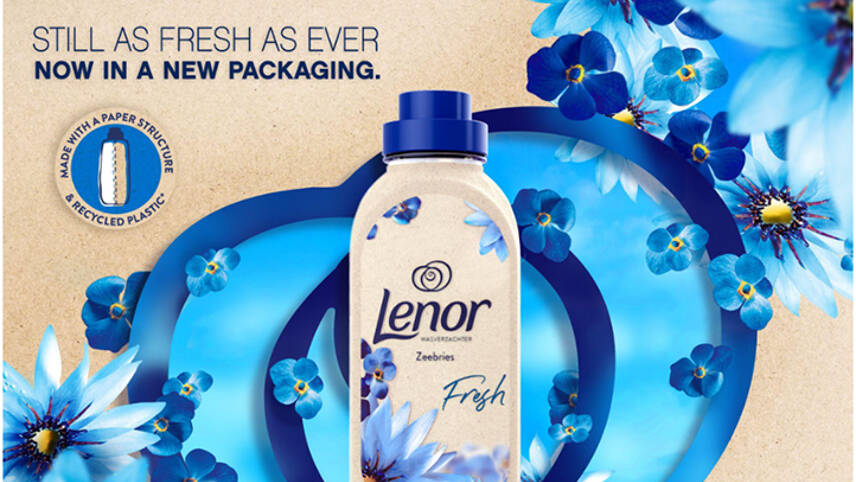Register for free and continue reading
Join our growing army of changemakers and get unlimited access to our premium content

P&G has confirmed that the prototypes that will go on sale next year will be composed of FSC-certified paper fibres
P&G Fabric & Home Care is working with the Paper Bottle Company (Paboco) to trial conditioners sold in paper bottles. A pilot is being conducted with Dutch supermarket chain Albert Heijn, with 120,000 paper bottles to go on sale in early 2023.
P&G’s vice president of R&D for Global Fabric and Home Care Sector Jerry Porter said: “Our vision to create a fully recyclable paper bottle that also holds liquids, protects the product, and maintains its integrity is an ambitious one.
“That’s why we believe that driving meaningful progress through partners and industry collaboration is what’s needed to get to this level of disruptive innovation. Each learning journey needs a starting point, and several iterations will be needed to achieve success.”
P&G joined the Paper Bottle Company (Paboco) collaborative initiative last summer. At the time, it announced plans to prototype a paper bottle for the Lenor brand, which will be fine-tuned before a pilot launch of 100,000 units in Western European markets.
In an interview with edie, Porter stated that the main challenges facing a paper bottle prototype were switching from a plastic bottle to the Paboco format for laundry products, like Lenor fabric enhancer.
The first prototypes consisted of a pulp-based paper outer and an internal barrier made from 100% recycled PET. The Lenor bottles maintain a plastic cap. Overall, the result is a 30% reduction in plastic used by weight.
P&G has confirmed that the prototypes that will go on sale next year will be composed of FSC-certified paper fibres. The inner layer of recycled plastics will also remain and P&G will monitor and explore how to merge the two materials.
P&G’s overarching commitments on plastic packaging include halving the use of virgin plastics by 2030, across all product categories. The Fabric Care Europe division has an interim ambition to reduce plastic use – including virgin and recycled – by 30% by 2025. The Home Care Europe Division is also going one step further and targeting no virgin plastic use at all from 2025. Other plastic-reducing innovations piloted by the FMCG giant include refillable aluminium shampoo and conditioner bottles with flexible plastic pouch refills.
Paboco officially launched in October 2019 as the result of a collaboration between renewable material company BillerudKorsnäs and plastic bottle manufacturing specialist Alpla. Its ‘paper bottle community’ of businesses includes big names such as The Coca-Cola Company, Carlsberg, L’Oreal and The Absolut Company and P&G.
Absolut hydrogen trials
Speaking of Absolut, the company has this week announced that its Vodka spirits brand will be produced using a partly hydrogen-fired glass furnace that will reduce the carbon footprint from its glass bottle manufacturing by 20%.
Absolut Vodka has signed an agreement with Ardagh Glass Packaging to use the part hydrogen furnace in the second half of 2023. Absolut has been working with Ardagh’s Limmared glassworks in Sweden for 40 years and currently uses natural gas and electricity to power furnaces.
Under the new agreement, 20% of the natural gas will be replaced with green hydrogen that will be produced onsite using renewable electricity. The use of hydrogen would reduce Absolut Vodka’s carbon footprint from glass by 20%
The Absolut Company has a target in place that all production of its Vodka products will be fossil-fuel-free by 2025, as part of a wider ambition to become carbon-neutral by 2030 without relying on offset use.
Absolut’s chief executive Stéphanie Durroux said: “Given we’ve been investing in our own production for decades, decreasing our emissions and increasing energy efficiency, we’re now in a position where we also can focus on the parts of our value chain that are outside or our own scope. The glass manufacturing industry is in a transformative journey, and the world can’t wait for the perfect solution.
“A bold and innovative approach is needed to accelerate radical change that will help solve the significant sustainability challenges that all glassmakers and buyers of glass face.”


Please login or Register to leave a comment.